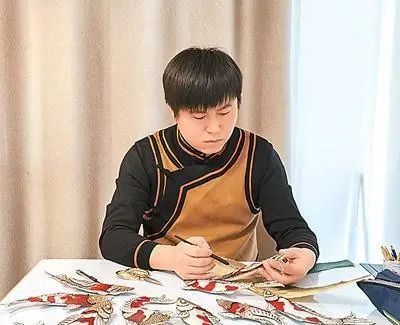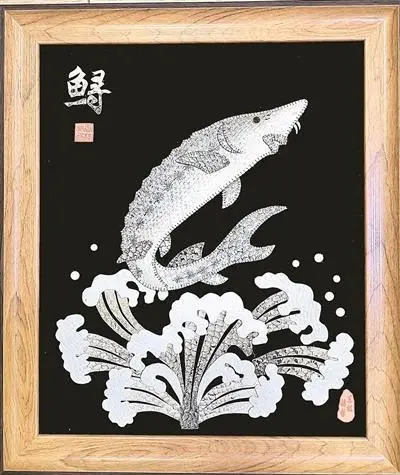




- BRNN
- BRI News
- BRNN News
- Database
Official Documents Polices and Regulations
Inter-government Documents International Cooperation BRI Countries
Business Guide Economic Data BRI Data
Trade
Investment Projects Latest projects
Cases - Content Pool
Tongjiang, a county-level city administered by Jiamusi city, northeast China's Heilongjiang Province, is one of the main settlements of the Hezhe ethnic group and holds the distinction of being the best-preserved sanctuary of the ethnic group's traditional culture.
The unique fishing and hunting culture of the Hezhe people has given birth to several world-class and national-level intangible cultural heritages, including Yimakan storytelling, fish-skin painting, and the craft of making fish-skin clothes.

A craftsman works on a fish-skin painting in Tongjiang, a county-level city administered by Jiamusi city, northeast China's Heilongjiang Province. (Photo courtesy of the publicity department of the Communist Party of China Tongjiang municipal committee)
In Tongjiang, the Hezhe people have seamlessly woven their cultural inheritance into daily life, turning their fishing and hunting culture into a thriving cultural tourism industry.
You Wenfeng is an inheritor of the national-level intangible cultural heritage of the craft of making fish-skin clothes. Now in her 70s, she explained she learned the craft from her mother.
Fish isn't just food for the Hezhe people - it's a symbol of prosperity and abundance. They have carried forward their aesthetic values, religious beliefs, and customs from generation to generation by making fish-skin clothes and decorations.
Fish-skin painting evolved from the skill of making fish-skin clothes, You said. According to her, early fish-skin paintings were mainly flat compositions, depicting everyday scenes like fishing and net-drying. The artwork capitalizes on the natural black, white, and grey tones of fish skin, creating a distinctive visual effect enhanced by fish scales.
Since the Hezhe fish skin processing technique was listed as a national intangible cultural heritage in 2006, the art of fish-skin painting has flourished.
Yang Shuangyan, a 49-year-old municipal-level inheritor of the Hezhe fish skin processing technique, has trained nearly 10,000 students at her training center since 2018.
She incorporates traditional paper-cutting techniques into her fish-skin paintings, which stand out with their delicate touch and personal flair.
Tongjiang now boasts over 10 companies that sell fish-skin handicrafts and nearly 20 intangible cultural heritage workshops, with annual revenues exceeding 10 million yuan (about $1.38 million).

Photo shows a fish-skin painting. (Photo courtesy of the publicity department of the Communist Party of China Tongjiang municipal committee)
In recent years, Tongjiang has stepped up efforts to bring intangible cultural heritages to schools, giving students hands-on experiences with their cultural heritage.
The No. 5 primary school of Tongjiang, built in 2019, has offered courses on intangible cultural heritages, which are popular among students and parents.
"Our courses on intangible cultural heritages of the Hezhe ethnic group, including fish-skin painting, Yimakan storytelling, pottery and paper cutting, are popular among both children and parents," said Yang Jiancheng, head of the school.
The city's commitment to preserving and promoting the unique Hezhe culture is evident in its 10,000-square-meter intangible cultural heritage exhibition hall, the largest of its kind in Heilongjiang Province. The hall is dedicated to intangible cultural heritages related to the Hezhe ethnic group.
Tongjiang has developed over 10 kinds of creative cultural products, including fish-skin clothes, fish-skin embroidery, and birch bark paintings.
"We encourage craftsmen to develop creative cultural products of the Hezhe ethnic group and hope that more people can learn about Hezhe culture," said Li Dingren, director of the city's intangible cultural heritage protection center.
"Since 2018, we have rolled out more than 30 charitable training sessions on the Hezhe fish skin processing technique, reaching over 2,000 participants," Li added, noting that the city is planning the next step in intangible cultural heritage promotion activities, including immersive fish-skin painting experience and educational tours themed on the Hezhe ethnic group's fishing and hunting culture.

Tel:86-10-65363107, 86-10-65368220, 86-10-65363106